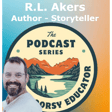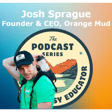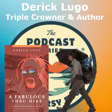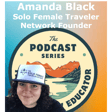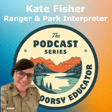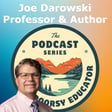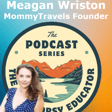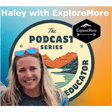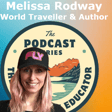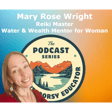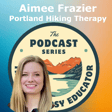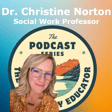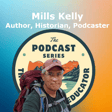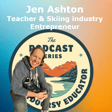Become a Creator today!Start creating today - Share your story with the world!
Start for free
00:00:00
00:00:01

Katy Purviance
This week we welcome Katy Purviance to the show. As a former teacher who moved around the globe teaching English, Katy has settled in Oregon where she operates an educational Co-Op. Join us to find out what drove her to education after starting on a very different career path!
Learn more about the Spokane Learning Co-op here: http://www.spokanelearningcoop.org Need to know more about Self-Directed Education? Check out Katy Purviance's weekly Substack: https://katypurviance.substack.com/
Recommended
Transcript
Introduction to The Outdoorsy Educator Podcast
00:00:01
Speaker
Hello and welcome to the Outdoorsy Educator Podcast, a place for conversation about travel, adventure, life lessons and making the most out of each and every day.
00:00:14
Speaker
I'm your host Alistair Green and each week I will have a conversation with someone who will not only inspire us all, but give us an insight into living life to its fullest.
Whole Earth Provision Company Advertisement
00:00:25
Speaker
But before we get started, a quick warrant from our sponsor, Whole Earth Provision Company.
00:00:38
Speaker
Since 1970, Whole Earth Provision Company has been the Texas outfitter for side quests, big and small. Whether you're gearing up for the open road, chasing a trailhead, or hunting for that just right gift, they have got you covered.
00:00:53
Speaker
Think durable clothing, shoes that will actually go the distance, gear that's road trip ready, and books, puzzles, and toys that will spark wonder at every age.
00:01:05
Speaker
You'll find Whole Earth in Dallas, Austin, Houston, and San Antonio, or anytime online at wholeearthprovision.com. And hey, because you're rolling with the Outdoorsy Educator podcast, here's a little extra love.
00:01:19
Speaker
Use the code OUTDOORSYEDU for 20% off your next adventure at Whole Earth.
Katie Purviance's Unique Journey
00:01:31
Speaker
After attending Harvard to study architecture, this week's guest's life was altered permanently by reading a book on education and realised teaching was where she wanted to be. Katie Purviance blazed a trail and became a world-travelling English teacher and discovered her true collie wasn't in blueprints but in building new ways of learning.
00:01:54
Speaker
Today she is redefining education in Oregon with a self-directed outdoors first co-op that's as inspiring as the journey that brought her here.
00:02:09
Speaker
Okay, and on this week's episode of the Outdoorsy Educator podcast, we have Katie Purvines. Katie, how are you today? Hello, good morning. I'm doing great. Thank you so much for having me on.
00:02:22
Speaker
wonderful for Oh, you're very welcome. And i was very excited to have you on when I knew a little bit about you. But now I've read your website, a little digging, I'm even more excited. i think we're going to have some great things to discuss.
00:02:35
Speaker
But before we get into that, why don't you just tell us a little bit about who you are, where you're from, that sort of thing. Sure, yeah. My name is Katie Provayans. I'm the founder of the Spokane Learning Co-op. I have been a teacher since 2013. I'm an English as a second language teacher.
00:02:52
Speaker
i have taught at all levels from pre-K to university in five different countries all around the world. and last year, we're coming up on our one-year anniversary, I founded Washington State's only outdoor self-directed education center.
00:03:08
Speaker
I love that. I've got so many questions about the co-op that we'll get to um because as many listeners will know, I've been in public education my whole career. So I'm very excited to hear about, you know, you decided one day you wanted to become a teacher.
00:03:24
Speaker
I'd love for you to talk us through that journey kind of from that moment to teaching abroad in lots of different countries. um i was meant I managed to find, I think, three of them on your website.
00:03:36
Speaker
So we'd love to hear a little bit about your educational journey.
Teaching Across the Globe: Experiences and Insights
00:03:40
Speaker
Sure. Well, my educational journey really got started in grad school. I was an architecture student at Harvard and it was a really big deal for me to be there. I'm a first generation college student, ah let alone the Ivy League, let alone grad school. Like it was a really big deal for me. Right. That's huge. Congratulations.
00:03:58
Speaker
yeah Thank you. um I just fell in love with architecture. i got my undergrad degree in microbiology. i just did not have a lot of guidance or role models growing up as far as higher education or what a career might look like. And so I was really pioneering the path for myself. And, you know, the internet did not exist at the time. So I was just kind of flying blind and trying my best with what I had.
00:04:25
Speaker
um And so once I got to Harvard, it felt so good to be there and so good to be around all of the other people who were there. um But really, I kind of hated it i hated it was it was 20 required classes. i had no choices in my classes. I had no choices in my projects. I had no choices in who my professors were. i had it was multiple all nighters every week. It was just so it was not only so much work. But if I look at what my vision for myself was as an architect, and what we were doing in school, they were completely different things. There was no overlap.
00:04:58
Speaker
Right. And so I'm like, what is happening? Right? Like, I'm not sleeping. I'm overworking. I'm stressed out. I doubled my student loan debt in one year. I'm like, what is this?
00:05:10
Speaker
I don't remember what I Googled, but something like, why is school like this? Right. That was my first, that was the moment that changed my life. I found John Taylor Gatto.
00:05:21
Speaker
I found his blog. And at the time he was, he was working on his magnum opus, the underground history of American education. And so at the time, what became that book was just simply blog post on his blog.
00:05:35
Speaker
And I felt like I found somebody who understood, somebody who had seen the man behind the curtain and was here to tell us all about it. i love that. but Every morning I'd read, I started at the beginning, every morning I'd read a chapter, I'd post it on Facebook, and then I'd go to Harvard to spend my like 20 hours there or whatever. um It took about a month before all of my Facebook or all of my teacher friends on Facebook unfriended me. And I'm like what, what is, what is that about? Like, why don't you want to know about the origins of your profession? Why aren't you asking these questions too? Right.
00:06:08
Speaker
So I ended up dropping out of Harvard after that first year, it was a four-year program. So was there for the first year. I, and And that summer, i read like 40 books on education. Like I became addicted and obsessed to learning about how learning works.
00:06:24
Speaker
Like what is learning? How does it actually work?
00:06:30
Speaker
And I'm still down that rabbit hole. That was 2009. I'm still down that rabbit hole. So that's how I got my started my start in education. That's just fascinating. And then what took you from that moment of just being, in your words, obsessed and consuming all this stuff to going abroad and teaching English? What what was that step like? Oh, boy. So I did not become a teacher right away. i had no interest in becoming a teacher. had interest in working in the school system. Like, I was starting, from reading all these books, I started to think about, like, what I could next because I was so interested in it, right? And I was thinking, like,
00:07:05
Speaker
Oh, it would be cool to have some kind of group, like some kind of cohort situation where we're learning about learning together like that really interested in me. I was looking at maybe I could start a blog about what I was learning.
00:07:18
Speaker
Like i was just, I guess I was in a teacher role, like thinking about how I could teach what I have just learned, right? How I could share this with other people. So was in that mindset right away, but I was not interested in actually becoming a teacher. Right.
00:07:32
Speaker
So it was several years. Like I ended up becoming a Girl Scout leader. Right. Kind of like a step towards becoming a teacher. And I still know this becoming a teacher.
00:07:44
Speaker
um But this was in Vancouver, Washington. And I had the largest and fastest growing troop in our city. Like I had ah brownies.
00:07:55
Speaker
What is it? Daisy's brownies. no, no. no Brownies, juniors and cadets. Right. So like elementary school girls, 18 of them all in one room working together. And it was the most magical thing ever.
00:08:10
Speaker
Seeing how having kids of mixed ages, how they work together and how much healthier sane that was and keeping them divided by ages like in the school system. So i was starting to get little hints about like what works and what doesn't work.
00:08:23
Speaker
um and then what was it some time went by and i started teaching online like i heard about teaching ah wait no i'm getting ahead of myself edit that part out no you're fine all right oh my gosh um i got to a point where i really wanted to travel wanted right more of the world.
00:08:46
Speaker
i had been in the Peace Corps in West Africa right out of college. So it was my first teaching experience. I was a biology teacher for seventh graders in French. So that was my very first teaching. Wow, wow that's a huge step, a huge leap of faith to do that.
00:09:01
Speaker
That was back in the year 2001, right? And that was That was a very different, like who I was as a teacher in that moment was very different from the teacher I became because I was just, I had no background in teaching at that point, right? I just finished my biology degree and was thinking about working in a lab or something. And so I was just kind of doing what I was told without asking about it, right?
00:09:25
Speaker
And so... I started really missing being abroad. i had had other international experiences. I once worked aboard a merchant marine training ship where we spent three months at sea and visited different countries along the way. And I think once once you get the itch to travel, can't turn it off.
00:09:43
Speaker
once you Yeah, I would agree. I don't really know anyone who has traveled extensively and then just kind of gone, now I'm done now. um It just doesn't really happen. it It becomes who you are. so I've now been to 24 countries.
00:09:58
Speaker
I've lived in eight of them and I've taught in five of them. I miss it. I miss it so much. um But yeah, I got to the point where I wanted to leave this country and expand my horizons and see other countries. And so I decided...
00:10:11
Speaker
And keep in mind at this point, I still wasn't like, oh my gosh, I love being a teacher. i was not even there yet. I was really fueled by a desire to go see other countries and other cultures and to leave this
Comparing Educational Systems Worldwide
00:10:22
Speaker
one. Right.
00:10:22
Speaker
And so I thought a really good way to do that is to get paid to do that. And a really good way to get paid to do that is to become an English as a second language teacher. Right. So I went to Vermont. I went to the School for International Training, which was the original Peace Corps training site.
00:10:38
Speaker
i got a degree. I did my internship in Poland. And then right after I graduated, i got my first job in Oman teaching English at a college in a small town. That's just, you're the you're the second guest in a row. Last week's guest, Ollie, spent some time in Oman.
00:10:55
Speaker
i you know I know of Oman and I've watched a couple of television shows about it, but it's a very small place. Not too many people go there. So it's really interesting to have two people in a row who have been to Oman. That's really interesting. I highly recommend it. Omanis are such friendly, good people.
00:11:14
Speaker
Like, please go. Everyone should go to Omanis. That was how it came up. Ollie has traveled and worked extensively around the world and it came up as one of his, I think he said top three places in the entire world to to visit because of the people.
00:11:28
Speaker
um so and So kind. Yes, it's a great coincidence. So yeah, we we can't talk highly enough about Oman. Yes, yes. um and So what I just kept traveling, right? I took some...
00:11:42
Speaker
Here's where I started. oh how I've not gone deep into this part of the story in a while. And so right loved I love being there. love the people. But the school system was not my cup of tea. Right.
00:11:57
Speaker
And so I took a little time. i traveled to Vietnam just because like I just spent some time traveling like you do. as you As you do. Yes. Yeah. And I wound up back in Portland, Oregon. um And then I started teaching Chinese kids online. And that really changed my life. Like I was really doing it because I knew I could do it.
00:12:18
Speaker
And money is nice to have. Right. sorry I was waking up at three o'clock in the morning to teach kids in China. And ah after about a month of this, i was like, i love this so much. I want to move to China and do this in person, right?
00:12:34
Speaker
And so that fall, I moved to Shanghai. I got a job at a bilingual school. And yeah, I was a second grade classroom teacher. That I'd love to hear. China fascinates me. um I've never been, my my dad has been, some friends have been, so some friends in education have been.
00:12:51
Speaker
How was your experience there? i love it. I loved it and I love it. i miss it. Wonderful. um My life was totally different there than it is in the States.
00:13:04
Speaker
right Here's, I think the best way to say it is that in China, I could afford to live as a teacher. And here in the United States, I cannot.
Influences on Katie's Educational Philosophy
00:13:16
Speaker
Right. Yep. but That's a very common thread. Yes. there um So teachers, foreign teachers in China, on top of your salary, we got an extra thousand dollars a month out pay for living expenses.
00:13:29
Speaker
The health care and I had insurance. It wasn't socialized health care, universal health care or any of the things we dream about here. it was it was insurance, but everything was covered. ah Same day appointments.
00:13:40
Speaker
I didn't pay anything. Right. like I got to go get taken care of. The end, there was no stress. It was so easy. I had survivor's guilt for how good it was compared to how it is here in the States.
00:13:53
Speaker
Yeah, that's, ah I mean, the insurance costs are certainly in the the school district that I have just left. I mean, it's, they're just, I'm very, I'm thankful for my time with the district that I just left. it and It's still an incredible district and it's kind of out of their control a bit.
00:14:07
Speaker
But the health, I feel so bad for the teachers still there. The health costs are just, as especially if they're trying to cover their family. Yeah. are astronomical i mean they really mean it's it's not just expensive it's prohibitively expensive for many many people and it's like what crying shame that is it's just terrible yeah and there's so many other examples i could give like how much cheaper transportation costs are how much cheaper food costs are how much cheaper living expenses are like All the day-to-day things you need to just survive are just so much more accessible there than here. And that was in Omega City, 25 million people, the world's longest subway system.
00:14:48
Speaker
Like, it is organized. And my plan, my plan going into China was i had started the process of getting my teaching license. hu I had my graduate degree in teaching English to speakers of other languages. And so I thought like, okay, I'll actually get my teaching license and maybe I'll just...
00:15:03
Speaker
go from country to country every few years and work at international schools. That sounded like a really good life, right? It was very similar to when I first entered the Peace Corps. I thought, okay, every two years, I'll just live in a different country. And that sounds like a really good life.
00:15:17
Speaker
But I got really, really sick in Burkina Faso. So I ended up not carrying through that plan. So it felt like picking up that thread again ah being an international person.
00:15:27
Speaker
Right. I love that. Somebody I spoke to in season one who was a student teacher across the hall from me 10 years ago, maybe now. it sounds just like such a similar path. She wanted to travel. She loved to teach.
00:15:40
Speaker
So as taught in China and Estonia, she taught in the States for a year, is now in Peru. you know, is just combining and and she loves teaching.
00:15:51
Speaker
But it's a bonus of teaching is it's a great tool to see the world. Yeah, it really is. I suspect she's not done traveling and teaching and will bounce around the world and I'm encouraging her to write a book when she's done.
00:16:10
Speaker
But I've got say something that jumped out at me. If I was fact could wave my magic wand and suddenly I was in charge of all education, the the not dividing by age is something that I suspect we'll get to when we dig into your co-op a little bit more. But i you know the things that kind of...
00:16:31
Speaker
that really drive me about education, I would love to see an elementary school. And I'm sure they exist. I've just not been to them. Whether it's almost like a house system where it's like kindergarten to fifth grade in one hallway. And those students, children, teachers work together.
00:16:48
Speaker
And you're pairing the older students to read with the younger students and a lot more of that. um The little I've seen, it seems like a really good idea.
00:16:59
Speaker
That's a really good idea. Well, you have you heard of Summerhill in the UK? Summerhill, I know of it. Yeah, I don't know much about it. ah Being from the UK, it's a familiar name.
00:17:11
Speaker
Summerhill is my number one influence. I read several books about Summerhill that summer of 2009, and I'm rereading one of them now. And it's so cool to be rereading it after all these years and to see how much it influenced my ideas about education and how much it influenced what I ended up creating.
Founding the Spokane Learning Co-op
00:17:29
Speaker
So one thing I didn't touch on, i touched on like kind of point A to point B, but I did touch on how I fell in love with teaching. And that was really my, like, I loved learning about learning as part of my graduate school program.
00:17:42
Speaker
But it was really during my internship in Poland where I'm like, this is the best thing ever to get to work with young people and to, for all of us to grow together together.
00:17:53
Speaker
And for all of us to be a little bit smarter together. i teach sitting down in a circle with my students. It's a very communal and community minded. and it's, it just lights me up in a way that nothing else did. And so it's so funny to me to think like I had zero interest in becoming a teacher. And it turned out to be the very best, like my truest vocation.
00:18:18
Speaker
Isn't that funny? It happens. And I think, like as you said, you can kind of pinpoint these little moments that come and they grab you when you least expect it And you're like, suddenly, this is what I want to spend. This is going to be my life's work.
00:18:30
Speaker
Is this. And I think there's something really beautiful about that when you don't necessarily go hunting for it and find it, but it comes and finds you. And often those moments are found in education when you're sitting on a carpet in the morning with a bunch of six-year-olds talking and you're like this is it this is what my life is going to be about and it's a it's it's a beautiful thing i love that you had that experience um so you said tell us a little more about it okay okay um so i got to a point
00:19:03
Speaker
And I want to say it was a gradual understanding. Of course, I was fueled and informed by all the books I had read and the ideas I was developing about education. and I came to this point where kind of like my hero, John Taylor Gatto, I realized that what learning is and what school does are two completely different things.
00:19:22
Speaker
Mm hmm. So John Taylor Gatto, he was a New York City school teacher for 30 years. He won New York City Teacher of the Year, New York State Teacher of the Year. And he writes about how he was just doing his job.
00:19:36
Speaker
He was just doing what was expected of him. He didn't go above and beyond. And he didn't shortchange the students either. if He just did what he was supposed to do. And he got to a point in his career where he realized that just by doing what he was supposed to do as a classroom teacher, he was hurting his students.
00:19:52
Speaker
Mm-hmm. And so he started asking, what is this? Just like I did at Harvard, like, what it why is school like this? And this sent him on this journey. he He went back and looked at the Boston Public Library and the archives to find the original meeting moment minutes from the original school of Board of Education.
00:20:12
Speaker
And he paints a very dour picture of the original intentions behind our public school system. And like if we go all the way back, what he was able to find is that the origins of our public school system has has its origins in Prussia, what we now call Germany.
00:20:31
Speaker
soldiers in excuse me Soldiers would be running into war, right? the The first soldiers in the line of offense in a war situation. And then as soldiers,
00:20:43
Speaker
whoever they're fighting against is firing on them, they would make the very sane and reasonable and human decision to turn around and run away and save their lives. Well, you can't win a war like that.
00:20:55
Speaker
So the generals are like, what do we do? how How do we make them fight our wars for us? And what they came up with was starting when they're young, make them more afraid of disobedience than they are of death.
00:21:10
Speaker
That's fascinating. and this is the kind of stuff that I just find so interesting and how far back a lot of this goes. um It just reminds me, so I'm currently working on my dissertation and something that I've been digging into but is simply the word play because education ancient Greece lot was based in play and just the meaning of the word and we've gotten away from it in some ways.
00:21:37
Speaker
um So education was yeah rooted in play which when we go to theater and we see a play, we sometimes think that that one has a different meaning than a child playing with playing with blocks on the ground. But actually it's the same thing. It's like your imagination.
00:21:54
Speaker
When you press, show my age, when you press play on a CD player, on your MP3 player, even on your iPhone, you're pressing play because it's that creative element coming out.
00:22:05
Speaker
And that again, I'm not even scratching the surface, but it's so interesting how far back a lot of what we do in education today goes. so It is fascinating.
00:22:19
Speaker
He describes some very heartbreaking, dar dark, dark moments in the history of education about how it is how it is and how it has always been a means of control.
00:22:35
Speaker
I used to, and I suspect this is, I don't want to put words in their minds, but your friends who you said, you know once you told them you're reading this book, sort of unfriended you.
00:22:46
Speaker
When I was started in education, ah used to sort of push back to a lot of that and think it's just nonsense. And I'm not saying it's it's too broad of a conversation to have a sweeping statement like it's all true or it's not true.
00:23:00
Speaker
But you've got to be open to these conversations. you know and And whether you agree or disagree in the end, that's fine. But have the conversations, I think, is crucial for educators to question what is education about what are we doing here and maybe we're doing great things but maybe there's some things to be improved and and and i think if we open ourselves up to just thinking about these things that you've brought up ah it it's going to do nothing but serve ourselves and our children better yeah ah it in my humble opinion of course yeah
00:23:38
Speaker
okay Yeah. um So you you how did you get from that? Now, a co-op. I'm kind of glad that I don't know exactly what it is. What my preconception of a co-op is is, families who are homeschooling their children, getting together and learning together.
00:23:59
Speaker
that's kind of about all I know. So I suspect that's probably true, but there's going to be a lot more to it than that. That is true. I'd love for you to tell me what a co-op is, and then we'll get into yours specifically.
00:24:10
Speaker
Sure, sure. So I should say I myself went to a co-op preschool to date myself in the 70s. Right.
00:24:20
Speaker
So I have memories of being in an outdoor space with lots of other parents around and lots of other parents being there to help. And nobody was the teacher. I was not aware. I have no memory of who the teacher was, but I do have memories of lots of parents being around and lots of parents helping.
00:24:36
Speaker
So it had this feel of a village. And that is what I'm trying to create in my co-op, a feeling of a village. um So we do have lots of parents around. We have lots of different kinds of families around.
00:24:49
Speaker
And the idea is that the one thing that unifies us all is we believe in self-directed education. And I can get a little bit more into that now. We'll put a bookmark in that.
00:25:01
Speaker
And so like we have three different weekly gatherings. And one has kids who are very young, like under the age of five. So for kids who are very young like that, the parents stay the whole time. And they are there on site. And they are present.
00:25:17
Speaker
And they are interacting with each other's kids together. Right. It is. It's that I've replicated my own preschool experience in a way, except we have a lot more mud and paint here at my co-op than I did in preschool.
00:25:29
Speaker
And then our next age group, we have kids who are like mostly what we would say elementary school age. So ages like five to 12, they're all together.
00:25:40
Speaker
And once a kid reaches the age of five, ah we allow for drop off. But we ask parents to stay once a month so that they can still be part of our community and get to know the kids and the kids can get to know them.
00:25:51
Speaker
We cook outdoors with the kids so parents will take turns leading the cooking and serving. And we treat the adults just like we treat the kids, right? It's very equal.
00:26:02
Speaker
Like everyone calls each other by their first name. We don't say miss this or Mr. or That or anything, right? It's just very non-hierarchical. And then our oldest group, we have a teen group.
00:26:13
Speaker
um The kids in that group are between 10 and 17 years old. And they also cook, but they take charge of the cooking much more than the parents do, right? they have They take on more responsibilities because they're able to and because they want to.
00:26:27
Speaker
Right. i find this age I've got some sort of parallels. ah Two years ago, I went up to and a a conference I was going to in New York City.
00:26:38
Speaker
So I went to New Jersey and visited a private school that thought was a fascinating place. um And, basic you know, the basics of it, it was built with every classroom had an indoor and an outdoor space.
00:26:51
Speaker
So one wall of the the inside classroom was all glass with a glass door to go to the outdoor learning space that led it then to the communal playground and things.
00:27:03
Speaker
But even at you know five, six years old, these children were the ones in charge of actually growing the vegetables, learning when they were ripe or ready, and then... picking them and taking them to the kitchen now they had you know a staff to cook and prepare the meals but it was that almost emotional investment and this is the food that we are eating we have grown learning how to not waste the food mother you know ah you know so very uh i mean the very important things um that unfortunately sometimes gets pushed out of education but it sounds like ah even though it was a a private school it had very sort of similar goals of
00:27:43
Speaker
making sure the children know the the food that you're talking about really jumps out at me knowing where this comes from it doesn't just miraculously appear on your plate um And I'd be curious to know one of the- sorry, I'm now taking over and I apologize. All these thoughts are coming into my head when you're talking.
00:28:01
Speaker
um When we've taken- when I was in public education in a K-5 school, we would take our kids to a science camp um every year, which is one of my favorite things to do for many reasons. and I won't get into all of them now.
00:28:15
Speaker
But one of the things I love was they really talked about food waste. Because a lot of these kids that where where I taught didn't have a lot of extra food at home.
00:28:29
Speaker
the idea The idea was you grab all the food you can. you know it was a it that sort of environment they were often living in. So when they had this buffet of food available to them,
00:28:40
Speaker
they would fill up multiple plates they couldn't eat and it went to waste. So it became a competition that they had ah a bucket or a bowl or something in the middle of the table. They would scoop the remaining food into and the table that had the least was the winner. And they were brought up on the stage and it was a big deal.
00:28:57
Speaker
So everyone wanted to win. And of course, the idea behind it was only you take as much as you want, but only take what you can eat or not wasting food. So I love the fact that you know, halfway across the country in a completely different environment.
00:29:12
Speaker
I'm sure that conversation has happened too about being invest invested in the food we're eating. Very much much so. very much so um we We're all guilty of having eyes bigger than our stomachs. I am guilty of that as well. And yeah, we see that with our kids and we try, we try to remind them like you can have seconds.
00:29:33
Speaker
Yes. but But, you know, take take what you know you can eat now. And then if you want more, you can have more, but don't take more than you can eat now. And it's the same conversation with paint. You can have more paint, but use up the paint that you squirted out first before you add on more paint.
00:29:48
Speaker
I literally just think, again, as you were talking, it's all about the food, but then it's not about the food. It's about life. I mean, we can transfer these lessons we're talking about to to paint, to anything else, to purchasing a home.
00:30:02
Speaker
Do you need, you know, the biggest you can possibly buy? oh i just it's i think the possibilities of this lesson are endless. Yeah.
00:30:13
Speaker
So what' so you have how many families, would you say, are involved in your co-op? Let me think. We've got just over 30-some kids.
00:30:24
Speaker
Okay. so And some of them have... siblings and some don't so I don't like off the top of my head I don't know how many families oh I was just trying to picture if this was five children or a hundred children
Vision and Challenges for the Co-op's Future
00:30:37
Speaker
okay you know what we're looking at um and is it based where you live or does it kind of move around or how does a co-op kind work There's different models. There are some co-ops I know of, like the idea of a homeschool co-op is a very, very common. i'm certainly not the only homeschool co-op in Spokane. There are many.
00:30:56
Speaker
and there are some who will meet at different parks every time. So we are very lucky. it took me It took me eight months to find our site, but we are renting 10 acres of land just north of the city, just outside of city. law ah We rent it from a church who owns the land.
00:31:12
Speaker
And so on the land, we've got our our little house. It's like a 12 by 16 foot little house. That's our arts and craft studio and our library and some storage space. We have an adjoining carport just for a roof. We've got a picnic table underneath.
00:31:27
Speaker
We've got a big kitchen cabinet under there. We do our cooking there. We have a propane oven and stove. combo and a propane tank. So all of our cooking is done right there. We have our check-in meetings and our rules meetings right at the picnic table.
00:31:39
Speaker
We have an adventure playground. We've got a nine-foot tall straw bale pyramid. We've got large-scale building materials and pallets and work gloves. The kids like making their own forts and houses and villages and all that. We've got a glorious mud puddle where there's lakes and rivers and bridges and tunnels and villages. and it just so magical and it's different every day. i was Yeah, it's going to just keep their attention.
00:32:06
Speaker
And I'm sure we'll have people listening who this is piquing their interest. So I hope you don't mind me asking you about this, but when you say you rent it, does that mean that every all the families involved chip in? Does the church help you? Or how does the sort of the the nuts and bolts of this work for people who are, like I said, there's a bulb, a light going off in their head thinking this sounds wonderful.
00:32:27
Speaker
and So for families who are interested in joining us, we do charge a reasonable monthly tuition. course. Right. We have different prices for whether you're really little and your mom and dad is there the entire time versus a higher price if your parents are dropping you off.
00:32:45
Speaker
um we If you do like multiple days a week, like a couple of kids do, like we give you a little bit of a ah discount right and for multiple days. So that's what that looks like.
00:32:56
Speaker
Okay, that's sort of the model. That's why I was just curious because I know we'll have listeners who go, well, how does this work? And I love the fact that you know the you found an existing sort of site in the church that's willing to help you guys out and provide a home for you guys. That just, again, sounds idyllic.
00:33:15
Speaker
We are very thankful for this land. It's so nice. it's It's kind of perfect. It's just outside of city limits. You don't hear any traffic noise where we're at The back of the property where we are, it's kind of lined with evergreen trees.
00:33:29
Speaker
White-tailed deer go by. The wild turkeys go by. We see quail. ah We saw a porcupine once. And I realized I had never seen a porcupine in real life. And I wasn't sure at first what it was. I'm like, what is that? Right.
00:33:44
Speaker
So that was that was a lot of fun for all of us to just stand around and talk about it and think about what it was trying to do and all of that. I love it. For those who have not been, I've been to Seattle.
00:33:57
Speaker
And then actually just two weeks ago, three weeks ago, I was on, um went to a festival, an outdoors festival. It's on the ah Columbia River Gorge. So right on the Washington and Oregon border.
00:34:09
Speaker
I mean, already knew that the scenery up there is stunning, but man alive, is it beautiful. um It truly is. So that just, you know, feeds my soul even more for this 70. What a great place for kids to be growing up.
00:34:22
Speaker
it is It is so beautiful. And I've been to every state. Washington is my favorite state. Like, I feel so lucky to live in my favorite state. I love that. i'm I'm not far behind you. I think I've done 45.
00:34:34
Speaker
um And Washington, I mean, it just is, it is something special for those people who have not been there. and Just absolutely wonderful. um so So where do you see this, like your work going? You know, I'm assuming,
00:34:50
Speaker
just just from talking to you that you're not thinking, oh, we've peaked, this is it, the co-op's going stay like this forever. you know Where do you hope it might go in five years, in 10 years? Yeah, so this is just phase one Right.
00:35:02
Speaker
My intention for us to be a full-time k through 12 school. And in Washington, what that means is being approved by the state to become, we would be a a private school. There are two other self-directed approved schools in the state of Washington. They're both near Seattle, of course.
00:35:21
Speaker
They were the very first people I called when I realized that I was going to start my school in Spokane. I called them up. I said, how do you do it? How do you do self-directed education and meet the requirements of the state?
00:35:32
Speaker
And they both do it a little bit differently, but they both do it. And that was my green light to go ahead. Once I knew that it was possible that somebody else had already paved the way that two other people had already paved the way, I knew that I could do it too.
00:35:43
Speaker
ah but Earlier this year, I got to drive out there and visit both of them and spend a couple of days at both of them and just see what was... and My biggest takeaway is that if we look at self-directed education as an umbrella term,
00:35:58
Speaker
there are different ways of doing it. So it was so helpful for me to see two very different ways of doing it. And then I also know other people who lead let's see, agile learning centers or Sudbury schools. These are also under the umbrella of self-directed education.
00:36:15
Speaker
So in the time that I started this journey till now, I've had many conversations with people around the country were like, how do you do it? There's so many different ways it can be done. And so I've been able to pull inspiration from all of these.
00:36:27
Speaker
But of course, my biggest inspiration is Summerhill, where the kids are free to play all day. Yeah, i mix excited and like I said, I know the name. I know kind of what they are, but I'm excited to dig into that.
00:36:39
Speaker
And I love that I'm assuming you there's a a global community of people ah who want this style of education for their children, for their families.
00:36:50
Speaker
So you can all lean on each other, even if, as you said, you do things a little differently. we talked about this earlier on actually you know there's nothing wrong with that but having those discussions is important how do you do things okay we're maybe going to serve our community this way little bit i love that you've got that community and immediately you had people to lean on It has been incredible. What I love so much about the self-directed education community around the world is we believe in this model so much that we just help each other. Right.
00:37:17
Speaker
I'm on a Discord. I'm on a couple different monthly calls with people around the country and in other countries. There's the Alternative Education Resource Organization, Arrow, that puts on an annual conference.
00:37:30
Speaker
They've got a directory on their website of schools similar to this or under that umbrella all over the world. There are a lot of us. I didn't do anything new. I just did it here.
00:37:41
Speaker
I love that. And I love i think that that phrase alone might be really motivating to people. You don't have to reinvent the wheel necessarily, but just doing it, doing it in your community where you are for your children, whatever that might be is really, again, a beautiful thing.
00:37:59
Speaker
So as we kind of wrap this up, I've got three questions i would like to ask you that I did not send you in advance deliberately, but I can always ah always pause if you want a moment to think.
00:38:11
Speaker
um If you could in invite anybody in the world to come and sort live and work and teach your co-op for a month, who would it be and why? Yeah, putting you on the spot here.
00:38:24
Speaker
i know like they said i'm bringing my tent i'm gonna you know gonna camp at the back of this church's land and i want to immerse myself in your co-op for a month and and give whatever i can give who do you think you would like to invite you know the first thing that comes to mind is and i don't is it okay if i don't have a person i have an idea of what kind of person but that's perfect there's no wrong answer So one thing, so I have to preface but so by saying we did not intend to become an outdoor school.
Dreams and Aspirations for the Co-op
00:38:57
Speaker
Right. We became an outdoor school because it was cost prohibitive to be indoors. But I'm so thankful that we were too poor to be inside because I that created the magic. And so I would love to have somebody who has all the outdoor skills that I don't have who can teach the kids good way to make a fire and all the survival shelters and all that I got to go to an ancestral skills camp.
00:39:26
Speaker
Earlier this year, ah just about an hour north of us, and I got to spend a week with about 80 people like this, who know all these skills who who can just live off the land and know what to do. I grew up in suburbia, don't know how to do anything. I'm a city boy myself. I understand.
00:39:44
Speaker
we when we get I'm not going to name drop, but when we get off, when we stop recording in a little bit, we're going to have an interesting conversation. I've got a lead for you. Okay, great. But I want someone like that who can just show us the way of how to how to make what we've got even better.
00:40:02
Speaker
i love that. Everything we need is around us. We just need to know how to utilize. love that. that's i love that Well, like I said, I know exactly who you would invite.
00:40:13
Speaker
We'll talk in a minute. um if second of these three questions, if you were given somebody knocked on your door and said, here's $10,000 to put towards your co-op, what would you do with that money? What would be the next phase of things you might build or provide or do for the longevity and the life of your co-op?
00:40:35
Speaker
Okay, so I have thought about this. So part of the process of becoming an approved school, that's our goal, right? And so I want everything we do to like push us towards that goal. um So part of the process is getting a building inspection, a fire department inspection, a health department inspection, and those are all predicated upon the idea that you have an indoor space.
00:40:56
Speaker
Ah, right. And we're renting our land. We can't really you know build on it. ah My idea, you know to throw it all the way back to architecture school, I would love for us to design and build our own off-grid straw bale lodge as our indoor space. And still have lots of land, have all the land. But for the designing and the building of our own space to be part of what we do as a community.
00:41:21
Speaker
And so i'm gonna I'm going to take your 10,000 and raise you a couple hundred thousand. Right. need who Who loves this vision, who wants this vision for their kids and their community to you know reach out.
00:41:37
Speaker
the The idea is us buying our own land, 20 or 30 acres, and making this happen, our own straw bale lodge, so that we have that indoor space. We have some pretty cold winters here in Spokane. It amazing to have ah space that is designed to be comfortable year round while being off the grid. And then also we can check those boxes with the state so that we can become a full-time school.
00:42:03
Speaker
I love the thought of you being able to utilize your architectural knowledge that you stepped away from full circle right all the way back. How cool would that be? well That would be an awesome thing.
00:42:16
Speaker
And my final one of these three questions what book or piece of music or work of art has had a huge impact on your life probably several but if you had to just choose one
00:42:33
Speaker
anything by A.S. Neal. He is the founder of Summerhill and he's written a number of books. i just bought earlier this year. I bought all of his books. I just want to get into his mind in a way that I haven't yet and really understand his experience because he has been such an inspirational figure in my own journey.
00:42:53
Speaker
I love that. Yeah, i I don't know him. I'm looking forward to looking him up and reading him a bit more. um As we wrap this up, you know, I'm sure there there's going to be listeners who this is a new world to them.
00:43:05
Speaker
How could they contact you, reach out to you, find out a little bit more about what you do? Yeah, there's a few ways. So our website is www.spokanelearningcoop.org.
00:43:18
Speaker
I've got my contact information right there. It's easy to sign up for the mailing list right there or just reach out directly to me. I'm very easy to find online. I'm very easy to find on Facebook.
00:43:29
Speaker
ah We've got our Spokane Learning Co-op page. You can contact me through Facebook. like a If you know the spelling of my name, you can get a hold of me. It's not hard. Right. Well, we'll make sure your name is spelled correctly in the show notes when we put this out.
00:43:42
Speaker
Well, Katie provides, this has been eye-opening for me. This has just been fascinating. So I really, really do appreciate you taking the time to join us here today. It's been an absolute pleasure. Thank you so much for inviting me.
00:43:55
Speaker
Of course. Thank you.
00:43:58
Speaker
Thank you again to this week's guest and I hope today's episode was as enjoyable for you as it was for me and perhaps even inspired your next adventure. If you did enjoy the show, please be sure to subscribe, leave a review or follow us wherever you get your podcasts.
00:44:15
Speaker
You can find more information at theoutdoorsyeducator.com or follow us on Instagram, TikTok or Facebook. Until next time, thank you so much for listening to The Outdoorsy Educator Podcast.
